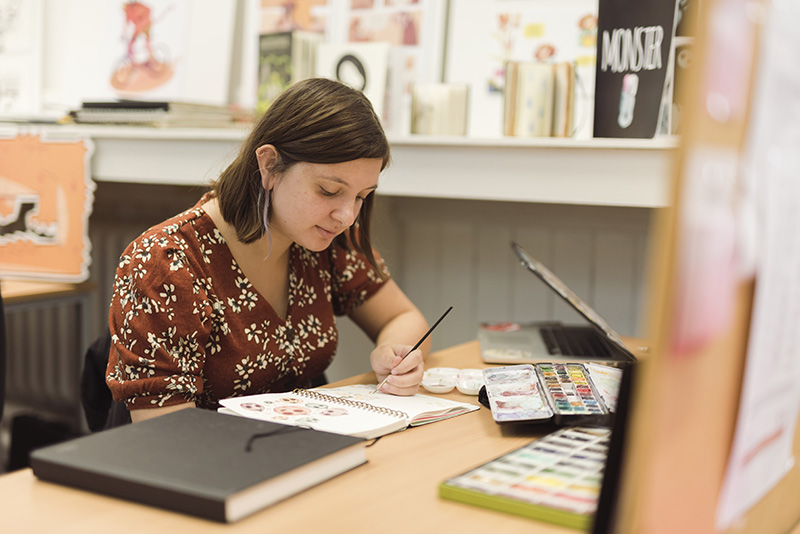Tips for Developing Your Portfolio

This month’s interview is with staff and students from the School of Creative Arts who have shared their top tips for developing your interview portfolio.
Which courses ask for a portfolio?
When you apply to a course in a subject like fine art, graphic design, and other hands-on disciplines, a portfolio is a very important part of your application. Other disciplines include: Computer Animation, Digital Filmmaking & Video Production, Digital Image Management, Digital Photography, Fashion Design, Game Art & Design, Graphic Design, Industrial Design, Interior Design, Media Arts & Animation, Visual & Game Programming, Visual Effects & Motion Graphics, Web Design & Interactive Communications, Web Design & Interactive Media.
What is a portfolio?
A portfolio is a collection of your work, or a 'visual diary', showing how your skills and ideas have developed over time.
Why do I need a portfolio?
Your portfolio helps us to assess your suitability for your chosen course. It shows your ability to work with different materials and themes and to select your most successful pieces. It shows evidence of your skills, technical and creative ability, self-motivation and independent thinking; work that perhaps goes beyond what is in the project brief – something that has made you want to do more, go off with a camera or sketch book and do your own thing. 3-D work can be awkward to carry, but if you can manage - bring it along – if not, bring photographs or a video on your phone.
What should my portfolio include?
- Finished and unfinished pieces
- Sketchbooks
- Notes and ideas
- Observational drawings
Visual research about a range of subject matter and examples of writing can also be useful. Experiments with different media, material, processes, tools and techniques, development work, screen-captures, contact sheets and documentation are also great to see. It may seem odd, but we are happy to see any failed works as these are often overlooked. Mistakes can be useful information and part of an iterative process – they can be generative and key to your creative, learning process. Work that you are unhappy with provides a useful insight into your critical thinking, and that is why we would like to see it. Tutor-led work and your own personal (and even private) work are also useful to see.
Can I bring research examples with me to talk about?
We are interested in what interests you! So bring in examples of the kind of contemporary art, media, architecture and design work that you’re looking at, as well as historical examples – these would be a useful prompt for conversation, so bring some examples of that in your folder or notebooks/sketchbooks or files. Sometimes our minds can go blank when asked to name your 'favourite artist'! So you may like to refresh your memory about who the artists, designers etc. are that fascinate you.
How should I present my portfolio?
Remember that entry requirements, including portfolios, are different for each course. Check the section of your chosen course's web page for more information or just contact us.
How do I submit my portfolio?
SCA only asks that you bring it along – whether it is a physical or digital folder is up to you and many applicants now have a blended approach – some physical work and some digitally produced or reproduced.
Do different levels of study require different portfolios?
Portfolio requirements are different for pre-degree, undergraduate and postgraduate levels of study, so it’s always best to contact the academic team for information about this. In many ways, the portfolio review has become a key part of the admissions process, as it is a point of learning and not just ‘a test’.
What if I don't have a portfolio?
Don’t worry! Contact us and we can talk it through.
Any last bits of advice?
Be yourself and enjoy the conversation with us – we don’t do ‘stress’ interviews!
(Also, be sure to check with your chosen course for any entry requirements and any additional information).
WATCH: Tips for developing your portfolio with Professor Alec Shepley, Dean of Faculty of Arts, Science and Technology
Get in touch
For further information, you're welcome to get in touch with our Faculty Engagement and Liaison Officer Alice James.